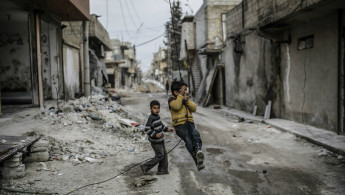UN 'extremely' concerned for children in Syria's Aleppo
The United Nations Children's Fund voiced its concern for the safety and well-being of children caught up in the violence engulfing the northern Syrian city of Aleppo, including the eastern neighbourhoods under government siege.
In a statement issued on Wednesday, UNICEF regional director Saad Houry called for unhindered humanitarian access to the divided city and for children to be protected.
"The escalation of this conflict puts children in horrific circumstances and will have dire consequences for them for years to come," the statement said.
"We call on all parties to the conflict to grant us unhindered humanitarian access to children and families wherever they are located across the city," it added.
UNICEF said children make up a third of the 300,000 residents trapped in the rebel-held besieged neighbourhoods.
In the western, government-controlled areas, UNICEF says 25,000 people have been displaced and are taking shelter from intense fighting in mosques, university campuses and public gardens.
Meanwhile a report published on Tuesday by the international children’s charity Theirworld, warned that around 1 million Syrian refugee children will be out of school in the new academic year, as schools across the Middle East face major budget shortfalls.
| Read Also: Ewan McGregor makes emotional plea during Iraq refugee-camp visit |
The five-year-long Syrian war has placed huge strain on the region's school systems, forcing neighbouring countries to depend on multi-billion dollar grants from donor nations to meet education needs.
There are 2.5 million Syrian children registered as refugees with the UN, the world body says. Most live in neighbouring Turkey, Lebanon and Jordan as they wait for an opportunity to return home.
In February, the international community pledged $1.4 billion in school funding for host nations at a London donor conference but less than $400 million of that has been fulfilled, Theirworld estimates. That leaves a funding gap of $1 billion.
Kevin Watkins, the author of the report and the executive director of the Britain-based Overseas Development Institute, said donors had "broken their promises."
In Lebanon, more than half of the nearly 500,000 school-age Syrian refugee children receive no formal education, according to Human Rights Watch, despite reforms allowing overburdened public schools to run two shifts a day.
Many Syrian refugee families have no choice but to put their children to work to help meet basic expenses in a country with few social protections and tight movement restrictions. Children who do go to school face difficulties with new curriculums, and many suffer from post-traumatic stress disorder or other psychosocial problems.
"The schools accept Syrian refugees, but the children don't adapt. They register but then they drop out," said Najah Kherallah Jomaa, a refugee from Syria's Aleppo living in a settlement in the Lebanese town of Bar Elias.
The report by Theirworld warns of a "lost generation" of Syrians if determined steps are not taken to ensure school access for all.
Agencies contributed to this report.





 Follow the Middle East's top stories in English at The New Arab on Google News
Follow the Middle East's top stories in English at The New Arab on Google News


